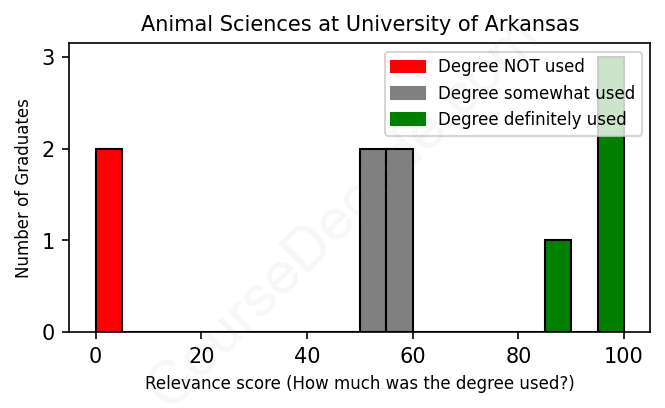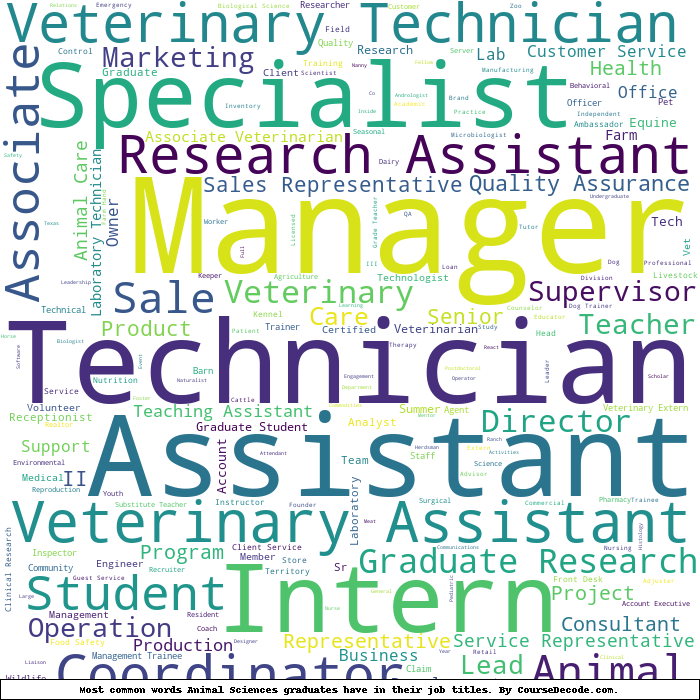
First, some facts. Of the Animal Sciences graduates from University of Arkansas we've analyzed , here's how many have used (or NOT used) their degree in their career:

These are estimates based on AI analysis of 10 LinkedIn profiles (see below).
The verdict? Below average. Overall, with an average relevance score of 60%, Animal Sciences graduates from University of Arkansas have a lower likelihood (-7%) of finding work in this field compared to the average graduate across all fields:
And for comparison, here's the chart for all profiles we've looked at across all degrees.
Also, after graduating, 50% of these graduates have pursued further education other than another Bachelor's degree (such as a Masters degree or other), compared to the average across all profiles of 35%. This suggests you may need more than just a Bachelors degree to be competitive as a Animal Sciences graduate.
See the details:
|
Relevance score: 0% We think this person has NOT gone into a career related to their degree. We think this person has NOT gone into a career related to their degree.
DEGREE INFOGraduated in 2022 from University of Arkansas with a Bachelor's degree in Animal Sciences. No other secondary education since. JOB HISTORY SINCE GRADUATIONAccounts Receivable Coordinator Resolve Tech Solutions Mar 2023 - Aug 2023 Accounting Analyst  PepsiCo Sep 2023 - Jan 2024 ABOUTNo information provided. |
The top 10 most common jobs done by the graduates we've analyzed (ranked most common to least) are:
When looking at the jobs held by graduates from the University of Arkansas who studied Animal Sciences, it’s evident that there’s quite a mix. Many of these individuals have found themselves in roles that don’t directly tie back to their degree, like police officers, dispatchers, and positions in retail. It seems like a number of people took their communication and problem-solving skills into various fields, which is great, but it shows that their day-to-day work isn't necessarily anchored in animal sciences. That said, there are some standout positions related directly to their studies, such as Agricultural Health Technicians at USDA-APHIS, Veterinary Assistants, and even roles at Tyson Foods where they engage with animal production processes. These roles make up a significant portion of the relevant job market they could tap into.
Overall, while some graduates have landed jobs that closely relate to animal sciences, many seem to be branching out into different fields altogether. It's kind of a mixed bag! If you’re thinking about a degree in Animal Sciences, it’s good to know that you could end up doing something directly related to animals, but also keep in mind that the skills you learn can be applied in a bunch of different jobs outside of that area. So, whether you're out there making a difference in animal health or managing a photo lab, your degree can still open up various doors for you.
Here is a visual representation of the most common words in job titles for Animal Sciences graduates (this is across all Animal Sciences graduates we've analyzed, not just those who went to University of Arkansas):

It seems that graduates from the University of Arkansas with a degree in Animal Sciences have taken quite a mix of career paths since finishing their studies. Many of the early roles right after graduation seem to be in various supportive positions related to animal care, agriculture, and even public service, like police dispatch and emergency room tech. For instance, some students worked as veterinary assistants or in agricultural roles at major companies like Tyson Foods and Simmons Foods. This indicates that right out of the gate, many are finding jobs that are at least somewhat connected to animal sciences, even if they're not always directly related to hands-on animal care.
Looking further down the line, say five to ten years later, the trajectories start to show more variety. While some alumni have stayed in animal-related roles, like agriculture teachers or in veterinary positions, others have drifted significantly into unrelated fields, such as accounting and project management. This suggests that, while a degree in Animal Sciences provides relevant skills for those passionate about animals, the job market can lead graduates into diverse careers that might not always directly tie back to their major. This shift could be due to the general versatility of their degree or personal career interests evolving over time. So, while there are certainly success stories in animal-related jobs, it’s clear that not everyone ends up where they might have initially expected!
Honestly, a Bachelor degree in Animal Sciences can be a bit of a mixed bag in terms of difficulty. At the University of Arkansas, like many places, you’re looking at a combination of hands-on experience, science courses, and some pretty intense lab work, especially when it comes to biology and nutrition. Generally speaking, it’s a bit tougher than your average liberal arts degree but not as intense as something like engineering or pre-med. If you’re really into animals and have a passion for it, you might find the material engaging and it could feel less overwhelming. Just be ready to buckle down on the science stuff, and you'll be just fine!
Most commonly, in the LinkedIn profiles we've looked at, it takes people 4 years to finish a Bachelor degree in Animal Sciences.
So, looking at these Animal Sciences graduates from the University of Arkansas, it seems like they’ve had a pretty mixed bag when it comes to making decent money. The folks who graduated in 2011 have mostly been in roles like police dispatcher and agricultural instructor, which might not pay the big bucks, while the 2014 grad at Tyson Foods climbed the ladder pretty well and likely earns a solid salary now. Fast forward to the more recent graduates, and you can see some are starting in lower-paying positions, like a veterinary technician or teaching aide, but they've got potential to move up. Overall, while some have landed decent jobs, there’s a sense that others are still working their way up or might not be hitting the financial goals they had in mind right out of school. It's definitely a climb, but there’s hope for better pay as they gain experience!
Here is a visual representation of the most common words seen in the "about" section of LinkedIn profiles who have a Bachelor degree in Animal Sciences (this is across all Animal Sciences graduates we've analyzed, not just those who went to University of Arkansas). This may or may not be useful:

Here are all colleges offering a Bachelor degree in Animal Sciences (ordered by the average relevance score of their Animal Sciences graduates, best to worst) where we have analyzed at least 10 of their graduates:
| College | Score | Count |
|---|---|---|
 Purdue University Purdue University
|
80 | 14 |
 California State Polytechnic University-Pomona California State Polytechnic University-Pomona
|
78 | 13 |
 North Carolina State University North Carolina State University
|
77 | 18 |
 Iowa State University Iowa State University
|
75 | 25 |
 University of Missouri-Columbia University of Missouri-Columbia
|
75 | 12 |
 South Dakota State University South Dakota State University
|
73 | 10 |
 The Ohio State University The Ohio State University
|
71 | 21 |
 University of Florida University of Florida
|
68 | 15 |
 University of Vermont University of Vermont
|
68 | 12 |
 Michigan State University Michigan State University
|
67 | 20 |
 University of California, Davis University of California, Davis
|
66 | 27 |
 University of Illinois at Urbana-Champaign University of Illinois at Urbana-Champaign
|
63 | 16 |
 University of Tennessee, Knoxville University of Tennessee, Knoxville
|
61 | 13 |
 University of Arkansas University of Arkansas
|
60 | 10 |
 California Polytechnic State University-San Luis Obispo California Polytechnic State University-San Luis Obispo
|
59 | 22 |
 University of Wisconsin-River Falls University of Wisconsin-River Falls
|
58 | 10 |
 Texas A&M University Texas A&M University
|
54 | 34 |
 Penn State University Penn State University
|
53 | 14 |
 Texas Tech University Texas Tech University
|
51 | 12 |
 Kansas State University Kansas State University
|
51 | 22 |
 Oklahoma State University Oklahoma State University
|
43 | 16 |